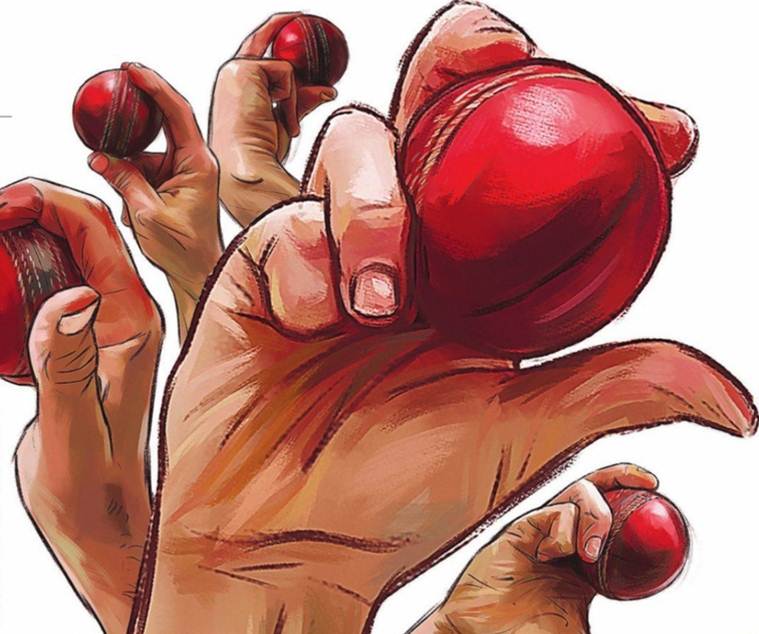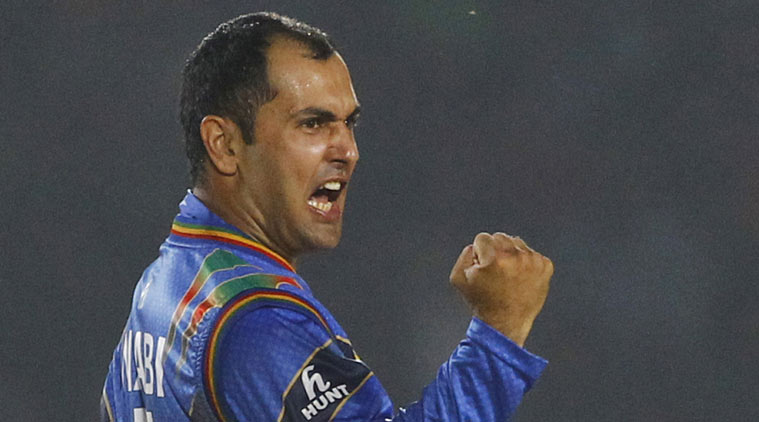Every team has a player who sums up its key characteristics and central philosophy. Afghanistan has two, the spin twins of Rashid Khan and Mohammad Nabi
Thank you for reading this post, don't forget to subscribe!
Rashid Khan has appeared in 57 ODIs and has 123 wickets under his name.
There are a lot of children in Afghanistan, but little childhood: Khaled Hosseini, Kite Runner
[This is from the touching passage in the final part of the novel when the protagonist Amir empathises with his childhood friend Hassan’s son, Sohrab, a slave with a landlord.]
Chapter 1
Mohammad Nabi, Afghanistan cricket’s talisman, hasn’t read this comforting story of redemption that stretches from the invasion of the USSR to the Taliban junta. But he could, however, identify with the line. “I had no childhood,” says Nabi, even as his eyes shrink at the repetitiveness of the question. Nabi’s words ring true, on a literal as well as metaphorical plane.
Literal because he hardly spent his childhood in Logar, the eastern province on the banks of the river Logar, where he was born before his family, landed gentry and politically influential, crossed over to a refugee camp in Peshawar. The faint memory of his birthplace has “bright green fields of wheat and multi-coloured glass windows of minarets.”

(Illustration by Shyam Kumar Prasad)
It seems more like an acquired, second-hand nostalgia as he left Logar, known then as the Gates of Jihad and once a bloody theatre of war between the US-trained mujahideens and the Soviet-backed Afghan government troops, when he was barely two. They left around 1987, two years before the withdrawal of Soviet troops.
Metaphorical because the life in a refugee camp was confinement minus the chains. “I shouldn’t be complaining, we were more privileged than a lot of others. I had decent schooling and lots of friends. But it’s no substitute for home. When you’re in the streets, people still call you a refugee. And the very feeling that you didn’t have a choice. It’s how I started bowling spin, too. I didn’t have too much of a choice.”
Like most of his ilk in the camp and Pakistani friends in the streets, he aspired to bowl fast. That’s how the narratives are woven in this neck of the woods. “Everybody was a fast bowler, so I got to bowl rarely. I used to get decent time to bat, but I always wanted to bowl, and to bowl I needed to find a different method to bowl. I decided to bowl spin.”
Years of refugeedom instills a streak of raw desperation to be different. Nabi calls it “smart thinking” and not the much typecast “warrior spirit”.
“You try to figure a way out of the mess, even before you’re in a mess. You want to be noticed, you want to be different. So when all of them were pacers, I chose to be a spinner, though inwardly I think like a fast bowler. So do most of our cricketers including Rashid (Khan),” he says.
Rashid’s initiation into spin bowling was different. “I was the fifth of the seven brothers. They were all good batsmen and all bowled leg-spin. Once you keep playing with someone who is much older than you, it helps you improve your game,” he says.
Then it dawned on him that he was physically endowed to be one. “I just think I was physically very talented to bowl leg-spin. My big, rough hands have helped me in gripping the ball better. While growing up, I would spend a lot of time on the fields with my father. I didn’t think back then. But now, I think it has helped me in my cricket,” he says.

Mohammad Nabi has appeared in 111 ODIs and has 118 wickets under his name. (AP/File Photo)
By the time Rashid, younger to Nabi by 13 years, got entranced by the game, the political climate had vastly altered. The anti-Taliban resistance was gathering force, before they were ousted. For most, though, life didn’t change much.
Rashid and his family lived under stifling fear and struggled for their livelihood in the saffron-rich Nangarhar province, under the imposing Hindu Kush mountains. But in the early aughts, cricket was inescapable for the youngsters in the province, especially in the city of Jalalabad, the cricket capital of Afghanistan. Its proximity to Pakistan is one explanation for that.
It was there, in the refugee camps, that many who had fled the fighting at home first fell in love with the game. And when they returned home, to a pile of wrecked helicopters and burnt fields, they didn’t forget the game that offered them a sliver of relief.
The poster boy, then, was a handsome all-rounder named Asghar Stanikzai, the first man to be picked for their national team. Back then they called Asghar “Dandy”, because he liked to dye his hair red with henna, and often wore a skullcap embroidered with jewels. His father had been a gem dealer, and his family had some money and a modern house in Peshawar. A spate of youngsters deified and tried to impersonate him. With their history of wars and generals, alpha-masculinity was embedded in their DNA. But then, there were others like Nabi who embraced the subaltern. And a decade on, with the emergence of Rashid and Mujeeb-ur-Rahman, Afghanistan has conveniently torn apart the big stereotype of them being burly, brawny hitters and wind-in-the-hair fast bowlers. They now celebrate those who ply a more nuanced craft, the perpetrators of “smart thinking.”
Agrees Rashid: “Back home, everyone in the academy is trying to become a spinner now. I am glad that I have become an inspiration to the next generation. It has changed the mentality in Afghanistan. They are now enjoying playing the sport and more are coming forward, which I think is a healthy sign. I, Nabi and Mujeeb are doing our best to change that perception in Afghanistan that it’s all about fast bowlers and hard-hitting batsmen.”
According to Afghanistan chief selector Dawlat Khan Ahmadzai, there are close to five lakh young cricketers in Afghanistan who want to bowl like Rashid. And there a lot of children in Afghanistan, and more hearteningly, a bit more childhood.
Not a word passes between us, not because we have nothing to say, but because we don’t have to say anything: Khaled Hosseini, Kite Runner
[While escaping to Islamabad in their yellow Mustang, before they would catch a flight to the US, Amir’s father Baba asks him to recollect his fondest childhood memory. Amir reminiscences his childhood with Hassan (originally his step-brother), a bond forged by Hassan’s kite-flying proficiency. Hare-lipped Hassan, the servant’s son, was from the lower Hazara clan while Amir was a well-bred Pashtun, but the unique kite-flying tricks blurred the class boundaries. And he says: “We were different, but the same.”]
Chapter 2
Different, but the same. Just like Nabi and Rashid. Nabi is a rather defensive off-spinner, tailored to the fabric of short-form cricket. He doesn’t believe much in flighting the ball or mastering the dark arts of loop and dip, but is exceptionally good at varying his pace and the modicum of fine (and not excessive) turn he generates. Nabi once talked about the difference between the Indian version of “Afghani chicken” and the real Afghani chicken in an interview to a Dehradun FM radio. “No masalas back home. I don’t like masalas.”
It’s the same about his bowling too. Rashid isn’t an orthodox big-spinning, revs-imparting leggie either. He is more in the Afridi-Kumble mould than Warne-Yasir Shah cast. Like Afridi, his run-up is hurried and arm speed quicker. His grip is more fingers than wrist, and he beats batsmen off the surface than in the air, more top-spin than side-spin.
“Everything about me is either Afridi or Kumble. I used to watch them bowl and tried to copy their action on TV and Youtube,” he says. Though like the Australian, he plays up the variations he’s working on: “I’m working on 3 to 5 variations, which I’ll use when I’m confident about them.” He walks with a global superstar aura — he wraps himself in the jerseys of six different franchises — and is the first million-dollar sportsman from the country, earning as much as 2.5 million.
Nabi, in contrast, undersells himself, keen to deflect the focus onto Rashid like Amir in the novel, where every day at some point of time or the other, he marvels about his friend’s mastery of the string and the kite. So Nabi goes: “He is twice as mature as I was at his age. He has that control, variations and guile, and I wouldn’t hesitate to rate him as one of the finest spinners in the world, much better than I’m.”
When bowling in tandem, be it for Afghanistan or Sunrisers Hyderabad, they hardly talk to each other, they don’t even exchange glances. Nabi laughs at this observation and explains: “No, I do. I cast envious glances,” he says. On a serious note, he says: “What should I tell him? He has a great understanding of his craft, and I’m not reluctant to admit that I learn a lot from merely watching him.”
They don’t even exchange notes, says Rashid. “We are very different bowlers and we share stuff about cricket, like how you would get a particular batsman out. Things like what you would do if a particular batsman goes after you. We don’t share notes or anything, but share our knowledge about our experiences more than anything else,” he elaborates.
But all that is superficial, when their understanding is telepathic and admiration mutual. There’s no need to pass words between them. They’re redundant.
For you, a thousand times over: Khaled Hosseini, Kite Runner
[Amir, after winning over Sohrab’s love in the end by indulging in a bit of kite-flipping, the tricks he learned by watching Hassan, is elated and tells the boy that he would fly the kite a thousand times over. The novel, dark, gripping and gloomy, ends on a note of promise, with the boy deciding to go along with him to the US.]
Chapter 3
Cricket, like a high-flying kite, offers the power of hope. Nabi doesn’t buy into the grandiose narrative. Even the gravity of a commonplace word like peace hangs awkwardly in the room. It doesn’t resonate with him. “I don’t believe cricket alone can bring peace. I will be happy if it opens up an avenue for them, a temporary relief. If more kids take it up, that will be great for Afghanistan cricket no doubt,” he says.
He’s too realistic to believe that sport can heal the wounds of war, even if the sport is gaining in popularity and spreading out to most parts of the country, changing lives en route. There’s no harsher a reminder of it than the fact that Afghanistan still don’t play international games at home, but in an Indian hill-station some 1,000km away. Then, last Ramadan, a bomb ripped through the football stadium in Jalalabad while a provincial cricket match was in progress.
A few years ago, Nabi’s father was kidnapped and held for ransom. Nabi’s own first visit to Afghanistan in adulthood shocked him. “I was traumatised. It was distressing to see bullet-riddled walls. A complete disaster staring at me in the face. But as you stay longer in the country, such incidents hardly shock you, because you hear such stories every day. Only if there is peace can you get shocked by the news of kidnapping and bomb blasts,” he says.
The suffering and hardships, though, have forged a sense of togetherness in the squad. “We had formed a close bond in the dressing room and we knew the suffering and agony will pave way for a better future, for a new generation. It’s what makes us forget all the pain and focus on the game.” he says. And to pull on the Afghanistan jersey over a thousand times.



